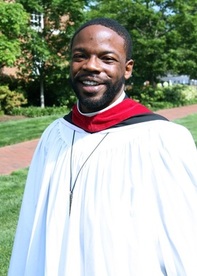
The Bible Challenge Reflection
Diocese of Southeast Florida
Day 176
Esther 4-6; Psalm 143; 2 Corinthians 2
In life, we never know the cards we’ll be dealt. Through life I have met folks who, for no admirably apparent reason, climb to the “top” of the social and professional ladders. I have also met folks who, like me, strive to be good parents, and for us clergy, good pastors to our parish. Often we find ourselves frustrated by those we love and serve. Life at times seems unfair. I have asked of God where is my reward for attempting to be a loving husband, father and a faithful pastor.
Haman must have been thinking similar thoughts about fairness, effort and rewards just before he was hung from the gallows (I cheated and read through Chapter 7 because the plot was so intense). This twist of fate came after Haman’s pride was hurt by Mor’decai’s refusal to pay homage to his superior rank. In retribution, Haman convinced King Ahasu-e’rus to pillage and to kill the Jews in his outlying territories. Haman was soon to have Mor’decai killed as well.
The plot thickens. Beautiful Queen Esther (a Jewess) steps powerfully onto the scene. She chooses to intervene for her uncle. Through her crafty manipulation of the king (with the help of some Divine intervention) Mor’decai is elevated for saving the king’s life where heretofore he was not honored for his “memorable” deed. Of course, Haman is devastated by the king’s decision; he wanted the honor and recognition going instead to Mor’decai! Things would only get much worse for Haman the next day.
In our story who won the day? Esther! And what gave her that opportunity? Beauty! She caught the king’s eye and was favored above all the other virgins. (I just love the Old Testament). Using today’s standards of female beauty, I wonder if a less attractive, overweight woman, despite having other superior qualities, would have won the day? This question may have gone through the minds of the virgins who were in contention to become queen. Life just doesn’t seem fair at times, does it?
What is an important message in our reading from Esther? God was accomplishing Godly purposes using Esther as a vessel to combat the forces of Darkness. Although God used Esther’s beauty to entice the king’s favor it was her willfulness to accomplish God’s plan that eventually saved Mor’decai. For God, it is not the outward appearance that is important, but the surrender of our hearts to do His will.
So, why then was Paul so upset in 2 Corinthians 2? Paul loved the Christian community in Corinth. And, clearly he was one of God’s human vessels: He was a chief Apostle, a Bishop! He was one of the great leaders of the early Christian church. But, after his visit to Corinth and his subsequent letter (1 Corinthians), Paul’s relationship with the Corinthians fell upon most difficult times. He was attempting to accomplish with them what he believed God was calling them to be and to do. Yet, for the best of intentions… the members of his community became offended, and a rupture occurred. He was personally crushed by this development. He sent a second letter by way of Titus to attempt to breach the gap. This letter which we don’t have today must have accomplished its purpose. Thanks be to God, the Holy Spirit built bridges of reconciliation. And Paul, in Second Corinthians, exclaimed his relief and gratitude.
Does Paul’s story and even that of Mahan or Esther resonate with you as you relate them to your family, parish, social groups or other associations? Like Paul, feelings of deflation sometimes sweep over me when I attempt to give my all only to find that my all is not good enough for those to whom I have given it. What am I to do? I despair and thrust my frustrations at God, fully desirous that my needs be met.
Before you continue reading this reflection, please stop and turn to the 143rd Psalm. Thoughtfully re- read it. Did you do it? OK. The Psalmist speaks directly to my heart. He, through experience, shares the perennial frustration of all who seek God and His will and strive to accomplish it despite apparent injustice. “Deliver me, O Lord, from my enemies! I have fled to thee for refuge! Teach me to do thy will, for thou art my God!!!!!”9-10
I reflect, “Who is my greatest enemy? Who keeps me from accomplishing the purposes of God? And I discover, it’s not those in my family who don’t agree with me. It is also not those in my parish who resists and rebel as I struggle to move them forward into Christ. It’s not ‘Life’s Cards’ that deals a better hand for others. The greatest enemy is me.” Only I can stand between God and what God is calling me to accomplish for God’s Kingdom. No one else can stand between God and me. My own self-centered pride leads to personal anxiety and to retreat and away from a loving and purpose-filled relationship with God.
So, although life may not always seem fair from our perspective, it is the life we have. Only you and only I can choose with the Psalmist to acknowledge in our hearts and to live through our lives, “Teach me to do thy will, for thou art my God!”10.
The Reverend Bernard J. Pecaro
St. Martin, Pompano Beach
 Reflection for June 28 or Day 173
Nehemiah 13, Psalm 141, I Corinthians 16
Two last chapters. Today, our reading of Nehemiah and of First Corinthians comes to a close. And the authors of both are full of remonstrations, advice, and direction.
Nehemiah recounts his final reforms and asks God to remember his good deeds in preserving the purity of Jerusalem. Paul admonishes the early Church in Corinth to respect those who have been sent to them and to continue firm in the faith.
How typical it is for those who have committed themselves to a particular project to use whatever means necessary to help ensure that it doesn’t fail. Both Paul and Nehemiah have spent their lives doing what they believed God had called them to do. Of course, they want to preserve their legacy and continue the fruit of their ministries. Their recollections of the past and their instructions for the future are direct and clear.
The teacher who retires from a school, the executive who leaves a company, the pastor who departs a parish…all after serving, and working and building for years…doesn’t the same thing occur? Letting go of something we have birthed and nurtured is always difficult. And sometimes our ego gets in the way. That’s when the psalmist can help: “Set a guard over my mouth, O Lord, keep watch over the door of my lips!” (Ps 141:3) The reality is that sometimes letting go is what must be done, and sometimes our vocation is to preserve what has transpired for those who come after us. The gift of discernment is solely God-given and something for which we all need to pray.
TVR Doug McCaleb is Dean of Trinity Cathedral, Miami
 Nehemiah 10-12, Psalm 140, I Corinthians 15
In the tenth chapter of the 1 Corinthians letter Paul continues to explain the benefits of the Law and how grace interacts with these benefits. "All things are lawful but all thing are not beneficial." is a good summary sentence for this Chapter and for all of 1 Corinthians. Paul brings us, and the Corinthians, back to what builds up. He focuses on the parts of the Law that bring us closer to God.
I have a personal experience of the Law as grace that I would like to share with you. I was reminded of it when reading Nehemiah 10-12. These chapters from Nehemiah bring together for the first time all the Laws and rules about giving. They have been brought up before in our reading, but this is the first time they are all in one place.
As a young person in the church I thought the rules about giving and tithing just seemed mean. It was too much. In no way did I understand these demands of the first fruits as loving. They seemed to me like the rules of a mean teacher that did not understand. They seemed to me to be punitive and harsh. The idea of giving ten percent to God seemed excessive. Then the Law became grace to me through a trip to Ethiopia. I was very lucky and got to take a trip to see some ministries there and visit the church in Lalibela (if you have never heard of these church they are worth googling. Each Church is made of one piece of rock). While I was their I learned that most Ethiopian children do not go to school because they cannot afford the $12 uniform and supply cost. I also learned that three dollars feeds a malnourished kid breakfast for a month. When I came home I was paralyzed with this knowledge. How could I buy a pack of highlighters for my work. That was a kid's breakfast. How could I go to the movies with my wife. That was a kid's schooling for the year. I was not able to function in the world with this knowledge. I got down on my knees and said "I cannot do this, I cannot give what you want me to give and function, I will never be able give enough. I just cannot do what you want me to do." And then, what I heard from God was "I know, you will never be able to do enough. You will never be able to give enough. But if you tithe, I will know you are trying. If you tithe, I will cover the rest." In that moment the Law became grace for me. In that moment I was lifted from my paralysis. With this reflection I am not asking you to give more or even tithe. I am only hoping to illustrate that the Law can be, and is, grace.
Keep Reading!
Spencer
The Rev. Spencer B. Potter
St. Andrew's Episcopal Church
 Day 171 – Nehemiah 7-9, Psalm 139, I Corinthians 14
The Ven. Thomas Bruttell
Mea Culpa, Mea
Culpa! I have no excuses for this blog being late. I often say, oh my schedule
has overtaken me and I have run out of time --- But who made my schedule and set
its boundaries?
Does this happen to
you? Do you, like me, sometimes fill your life with the less important matters
and push those more important things backward? Might it be that we are too often
we fill our time with the ‘less important’ avoiding our relationship with God?
Might it be that our own egos setting schedules that diminish our time with God?
The Good news is here from the Psalmist’s mouth.
As the Psalmist
reminds us today that we have an “Inescapable
God.”
You know when I sit down and when I rise up;
you discern my thoughts from far away.
3 You search out my path and my lying down,
and are acquainted with all my ways.
4 Even before a word is on my tongue,
O Lord, you know it completely.
5 You hem me in, behind and before,
and lay your hand upon me.
6 Such knowledge is too wonderful for
me; it is so high that I cannot attain it.
7 Where can I go from your spirit?
Or where can I flee from your presence?
8 If I ascend to heaven, you are there;
if I make my bed in Sheol, you are there.
9 If I take the wings of the morning
and settle at the farthest limits of the sea,
10 even there your hand shall lead me,
and your right hand shall hold me fast.
11 If I say, ‘Surely the darkness shall cover me,
and the light around me become night’,
12 even the darkness is not dark
to you; the night is as bright as the day,
for darkness is as light to you.
 Day 170 or June 25, 2013
Nehemiah 4-6, Psalm 138, 1 Corinthians 13
Steadfast Love
Steadfast is not a word we use much these days. We cannot imagine an employer saying to an employee, “I expect steadfast loyalty to our company” or lovers saying to one another, “I will be steadfast in my love for you.” Yet the word ‘steadfast’ in Holy Scripture is common and connotes constancy and strength. Steadfast love is love without measure, love that cannot be daunted by evil or weakness. Steadfast love is the love of which we hear in 1Cor 13, now a standard in the sacrament of A Blessing of Marriage. We cannot hear it enough.
Ezra and Nehemiah were originally one book telling the story of the return of the exiles from Babylonia and describing the rebuilding of Jerusalem. Ezra speaks of the LORD extending to him steadfast love. (7:28 and 9:9) “For we are slaves; yet our God has not forsaken us in our slavery, but has extended to us his steadfast love before the kings of Persia, to give us new life to set up the house of our God, to repair its ruin…” Not only were they restoring the house of God but they were restoring the very culture of a people. They were “a godly remnant with a religious mission” (NRSV; The New Oxford Annotated Bible p.581OT) bolstered in the steadfast love of God. And Nehemiah, in steadfast prayer, inspired his people to work for God in the areas in which they were familiar and skilled. When their enemies threatened, Nehemiah persevered. (Neh 4) When opposition from within rose up, Nehemiah did what was right and regained their trust. (Neh 5) Even as governor, he was of the people. Steadfast in his love of God he worked as they worked and took neither extra food nor wine as could have. When conspiracy against him was evident he saw through it and they completed the wall. (Neh 6)
With the psalmist, we give thanks to God for this steadfast love. Steadfast, righteous, pure love from God and for God and for one another is all we really know on earth and all we need to know. All else falls short, all else incomplete, all else but distraction, all else a shadow.
Reread 1 Corinthians 13 as if for the first time.
Rejoicing in the steadfast love of Christ,
Wendy Tobias
 Bible Challenge Day 169 - #DailyBread - Psalm 137: "By the Rivers of Babylon"
Imagine being taken captive: stripped away from your homeland and forced to live among a strange people with strange customs. Broken and desolate, all you can think of is returning to the place where things make sense...where things are familiar.
This was their experience, while the Israelites were in exile in Babylon. Admiring the richness of their culture while despising the people of that culture, the Babylonians sought for the Israelites to sing the joyous songs of the Lord. Yet, their reply - whether articulated or intimated - was how can we sing the Lord's song in a strange land?
The land indeed was strange, because the people did not honor the ways of God. Their society was powerful and successful, but it was godless. The Israelites could not dishonor God by singing righteous songs for the enjoyment of the unrighteous.
How indeed can we sing the Lord’s song in a strange land?
The Ancients would pray this Psalm as a reminder that we, of the Faith, find ourselves in exile in a strange land. And during our exile, we pledge ourselves to remember the Lord and to prefer His Holy City.
One of my favorite reggae artists performs a song that sets the mood for this meditation: http://www.youtube.com/embed/EPtbln1N4K4.
This land is not our home. And the head of this land is not our Lord. Do you remember the Lord? Do you remember Zion? How do you remind yourself that you are an exile in this land?
Receive Fr. Jabriel Ballentine's daily bible study meditations via Facebook at www.facebook.com/JahBreadSite. For more information on Fr. Jabriel, please visit www.JahBread.com.
 Reflection Day 97
Ezra 10; Psalm 136; Corinthians 11
Bede says of Ezra, “Now Ezra himself was clearly a type of the Lord Savior too, inasmuch as he restored sacred Scripture, recalled the people out from captivity to Jerusalem, enriched the Lord’s house with greater gifts, appointed leaders and guardians beyond the river Euphrates who were familiar with God’s law and purified the descendants of the exiles from their foreign wives.” (Ancient Christian Commentary on Scripture, V, ed. By M. Conti, p. 331)
Ezra, “in mourning over the faithlessness of the exiles,” gathered the returned exiles in Jerusalem. Insisting that they sit in an open square in the freezing rain, Ezra urged the exiles to “make a confession to the Lord…” Ezra saw the returned exiles as a godly remnant and begged them to renew the covenantal teachings and behaviors, handed down to from God to Moses. Teachings that kept them distinct – a people chosen by God. Ezra urged them to separate themselves from wives and children who held pagan beliefs, and who might possibly lead them astray. He stressed the importance of returning to God with an undivided heart, soul, and mind. He encouraged them to “Make a confession to the Lord the God of their ancestors, and do his will; to separate themselves from the peoples of the land and from foreign wives.”
The exiles agreed. “It is so,” they cried out. They separated themselves from wives and children. They made sacrifices in order to once again be in right relationship with God.
Ezra was a hard worker – devoted to the mission of bringing people into a right relationship with God.
The psalmist tells us in 26 different ways that God’s “steadfast Love endures forever,” even when we are in “our low estate.”
Charles H. Spurgeon said of Psalm 136, “We know not by whom this Psalm was written, but we do know that it was sung in Solomon's temple (2Ch 7:3, 6), and by the armies of Jehoshaphat when they sang themselves into victory in the wilderness of Tekoa. From the striking form of it we should infer that it was a popular hymn among the Lord's ancient people. Most hymns with a solid, simple chorus become favourites with congregations, and this is sure to have been one of the best beloved. It contains nothing but praise. It is tuned to rapture, and can only be fully enjoyed by a devoutly grateful heart.”
The psalmist was a hard worker – devoted to the mission of bringing people into a right relationship with God.
In Corinthians Paul chastises those who “eat the bread or drinks the cup of the Lord in an unworthy manner…” He reminds the newly converted Christians that they need to set aside differences of income, class and habit. Paul teaches that in coming together to share in the body and blood of Christ – the Eucharistic meal – we are all one before God. He points out that if we are to achieve a right relationship with God we must approach the Eucharistic table in humility and with love (Agape).
In his 1994 book, A Feast of Meanings: Eucharistic Theologies from Jesus through Johannine Circles, Bruce Chilton wrote that Paul "indeed 'received from the Lord' (1 Corinthians 11:23) what he 'handed over' to his hearers (1 Corinthians 11:2). Eugene LaVerdiere wrote: "That is how Paul introduced the tradition, presenting himself as a link in the chain of Eucharistic tradition. He received the tradition of Eucharist in the early 40s while in the community at Antioch. He handed it on to the Corinthians in the year 51 when first proclaiming the gospel to them. Like Paul, the Corinthians also were to become a link in the chain of Eucharistic tradition, handing on to others what Paul handed on to them.
The letters of Paul and the Acts of the Apostles make it clear that early Christianity believed that this institution included a mandate to continue the celebration as an anticipation in this life of the joys of the banquet that was to come in the Kingdom of God.
Paul was a hard worker – devoted to the mission of bringing people into a right relationship with God.
Throughout Scripture we are reminded that, in one way or another, God expects us to remain in “right relationship” with him. Our covenantal promise demands that we have no other gods; that we move through life in neighborly love; and that when we experience a crisis of fidelity we “repent and return” to the Lord.
God expects that we will be hard workers – devoted to the mission of being in, and bringing others into, a right relationship with him.
To whom do you turn for nurture and guidance in this lifelong spiritual journey? How do you keep your relationship with God in the forefront of your life? How do you help others as they struggle to remain in right relationship with God?
The Rev. Clelia P. Garrity, LCSW; St. Paul’s Episcopal Church, Delray Beach, FL
 Friday, June 21, 2013
Day 166 – Ezra 7-9, Psalm 135, I Corinthians 10
Marty Zlatic
In the reading from I Corinthians 10 today, Paul cautions his audience about what happened to our ancestors in the wilderness. As in the chapters from Ezra today, many had fallen away from the commands of God, and only a remnant remained in God's grace. Paul states that God's chosen were under the cloud of God's protection, they had all been delivered by God, and they all ate the spiritual food and drink that God gave them. Yet, most of them "were struck down in the wilderness (1 Cor 10: 5b)."
Here in the Church we live similarly in relationship with God today, in some sense still under the cloud, having been delivered by baptism, and we too eat of the spiritual food and drink God gives. The cautionary tone of impending disaster makes me pay attention to the reasons Paul gives for the demise of those who came before us. Some were struck down because of idolatry (verse 7). I think I'm okay on that one. Some were struck down because of sexual immorality (verse 8). I think I've got that one under control. Some met their ruin by putting Christ to the test (verse 9). I don't think I've done that in a long time.
So right when I think I'm in the safe zone, Paul adds another one: others were "destroyed by the destroyer" -- why? for COMPLAINING! Now I've got to be a little more than concerned about my situation. If complaining is on the same level as idolatry, sexual immorality, and putting Christ to the test, I think I'd better start working on my gratitude.
It is so easy for me to complain to God about the demands, difficulties, and distractions that disrupt, but perhaps what Paul is telling us is that especially those of us who are God's chosen, who are under the cloud of his protection, all need a dose of today's Psalm 135: "Praise the Lord. Praise the name of the Lord; give praise, O servants of the Lord, you that stand in the house of the Lord, in the courts of the house of our God" (Psalm 135: 1-2).
On this the longest day of the year, as we continue in this long stretch of green vestment Sundays after Pentecost, it can be easy for us to get into a rut of complaining and negativity. As one of my favorite theologians, Kermit the Frog, states, "It's not easy being green." Perhaps the opportunity before us in this long stretch of summer weeks is an opportunity to concentrate on gratitude for all God's gifts to us.
With gratitude for all of you,
Marty Zlatic
 Ezra 4-6, Psalm 134, 1 Corinthians 10
This week I listened to a podcast from The General Theological Seminary, my alma mater (go penguins!) about the Cyrus Cylinder. This pottery cylinder, about the size of a football was buried with the proclamation that Cyrus who was a Zoroastrian, had been allowed by the chief god of the Babylonians Marduk to come in and conquer the people. This was done because their king was not following the laws of Marduk and was not a good king. (This appears to be true from a political point of view.) What is more, he allowed the people – at least some were listed on the cylinder – to go back to their homes and rebuild their places of worship.
In our scriptures, however, this was given a different understanding. Yes, Cyrus was allowed to become king over the entire region, but that blessing comes from God, not from Marduk. We see it again in the readings for today as the people in Jerusalem write back to King Darius and ask him to look up the decrees that Cyrus had made regarding the return of the people. Apparently, he found it!
This is one of the very few places where we have historical records that confirm the Biblical record. There are very, very few records going that far back. Most of what we believe happened cannot be verified.
This is always the “problem” with faith. Paul has some of the same problems in his ministry. He was not one of the followers of Jesus in his lifetime and it seems plenty doubt if his ministry, his apostleship, is verifiable. For those of us who have tried to explain an experience of God to others, we know how hard that can be. It would be so much easier if there were proof!
The only proof we will ever have that we have known Jesus, that we have been reborn, and that we are his followers will be in our lives. We can say, “The Lord told me to do this.” But if other’s lived experience of us does not show forth love and kindness, they will never believe us.
I’ve heard it said; if you want to know if someone is a Christian, don’t ask them. Ask their neighbor. May we all be transformed by the love of Christ and be known not by our creeds, but by our lived lives.
 Reflection for June 19, Day 163
Day 163
Ezra 1-3, Psalm 133, I Corinthians 8
Thanks be to God…we are finally out of I & II Chronicles. I felt as if I were perpetually stuck in an ancient version of “Forrest Gump” listening to Bubba recite the numerous ways in which shrimp can be cooked. I & II Chronicles along with I & II Kings were however a wonderful synopsis of the children of Israel’s myriad twist of fulfilling God’s promise to live as a
“chosen people.”
Chapter 8 of I Corinthians looks a first blush to be meaningless to us in the
21st Century, that is, assuming that all of your are actually living in the 21st
Century. (Just a joke…relax…take a deep breath!) He spends all of chapter
8 talking about the various nuances of dealing with people who offer food to
idols, hardly a common experience for us today. But a closer look at Paul’s
pastoral advice gives us a great deal of wisdom in dealing with our everyday
relationships.
Paul first addresses those who have become puffed up with pride because of
their experience with the Risen Lord, especially as they relates to those who do
not believe, or as we might say today, those who are different from us.
Paul counsels against pride in favor of “love” because “…love builds up”. (vs 1)
He continues his counsel by stating that although the food is offered to an
idol, “an idol stands for something that does not really exist…” (vs 4) In other
words, the offering goes to nothing for to us there is only “one God, the
Father, who is the Creator of all things and for whom we live; and there is only
one Lord, Jesus Christ, through whom all things were created and through whom we
live.” (vs 6)
Paul sets a pastoral principle here that has been the hallmark of Anglican
pastoral approach to those who differ from us. Paul sets the tone for how we can
live with as well as vigorously share our faith with all people. He draws
attention to the reality that although we may know the Risen Lord, not all
people have so experienced this blessings! “But not everyone knows this truth.”
We are cautioned not feel prideful or puffed up as if we are better than others
but as if we have been blessed. We have received a gift, a gift to be shared in
love and compassion, not to be a battering ram for submission. Paul seems to say
that even though we do have something special that the world cannot find of or
by herself, we have received a precious jewel as a gift that by the very nature
of the gift must be shared with love and compassion. Of course, Paul will go on to describe this gift as “grace” and go into details as to grace’s nature and
blessing. But for us to day, our attitude should be one of embracing rather than
proving that we have been given knowledge that sets us above an apart from
others.
Much of what Paul comments upon about marriage in chapter 7 is applicable to
his advice in dealing with people in as a whole. At General Convention many
years ago, Bishop Michael Curry commented on the qualities of grace in marriage
that set the stage for a successful marriage. He said, “Do you want to be right
or do you want to be married.” Wow…talk about hitting the nail on the head. Yes,
marriage and for that matter any relationship aways depends on the deep seated
awareness that our relationship with God does not cause us to become puffed up
but rather to become humble in all our relationships. This I have come to know
all to well over the years. Last week, Annabel and I celebrated 45 years
of marriage. The success of continuing to be vibrant all these years is a
tribute to grace which always teaches that being together is far superior to
being “right”.
The Ven. Dr. Bryan A. Hobbs
Archdeacon
Diocese of Southeast Florida
|










 RSS Feed
RSS Feed